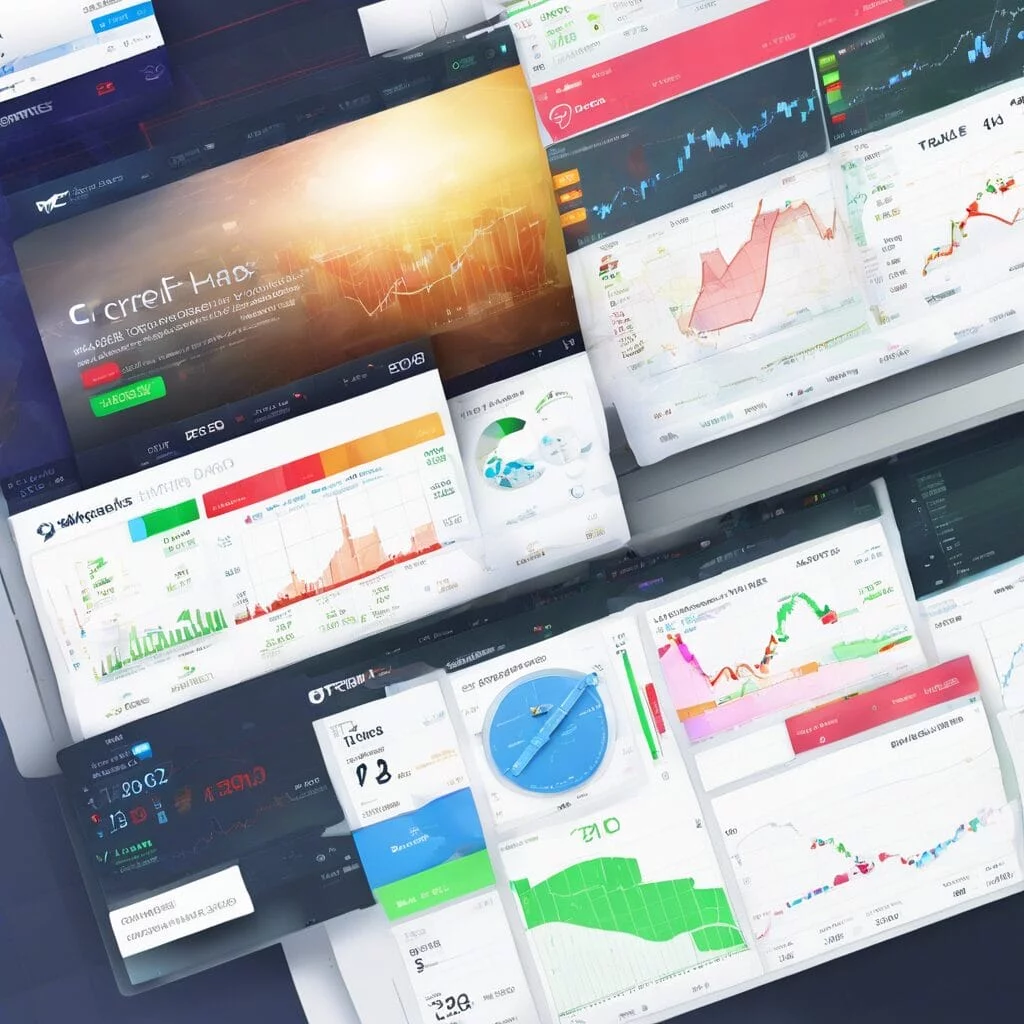From Novice to Pro: Step by Step Online Trading for Beginners
Introduction to Online Trading
Online trading has become increasingly popular in recent years, offering individuals the opportunity to buy and sell financial instruments from the comfort of their own homes. This form of trading involves the buying and selling of various assets, such as stocks, currencies, and commodities, through online platforms provided by brokerage firms. It provides traders with access to global markets, allowing them to take advantage of market fluctuations and potentially make profits. Online trading offers flexibility and convenience, as traders can execute trades at anytime from anywhere in the world. However, it is important to note that online trading involves risks, and beginners should thoroughly educate themselves before entering the markets.
A Definition and Basics of Online Trading
Online trading refers to the buying and selling of financial instruments, such as stocks, currencies, and commodities, through online platforms provided by brokerage firms. It allows individuals to participate in the global markets and take advantage of price movements to make potential profits. Online trading offers convenience and accessibility, as traders can execute trades from anywhere and at any time. To get started with online trading, beginners need to set up a trading account, choose a reliable online trading platform, and learn basic trading strategies. It is important to understand market trends and factors that affect them to make informed trading decisions.
B Benefits of Online Trading
Online trading offers several benefits to beginners looking to enter the financial markets. Firstly, it provides convenience, allowing traders to execute trades from anywhere and at any time. This flexibility encourages active participation in trading activities. Secondly, online trading platforms offer access to a wide range of markets and instruments, providing diversification opportunities and the ability to capitalize on various investment options. Thirdly, online trading often comes with lower transaction costs compared to traditional methods. Moreover, it offers real-time market data, research tools, and educational resources to help traders make informed decisions. Overall, online trading empowers beginners with the tools and opportunities to potentially grow their wealth in the financial markets.

Understanding the Market
Understanding the market is crucial for online traders. They need to be aware of the types of markets and assets available for trading. Common types of markets include stocks, bonds, commodities, and currencies. Each market operates differently and is influenced by various factors. Traders should also consider the volatility and liquidity of the markets they intend to trade in. Factors such as economic indicators, geopolitical events, and market trends can significantly impact the performance of assets. Therefore, online traders should stay informed about the latest news and developments that can affect the markets they are trading in.
A Types of Markets and Assets Available for Online Trading
When it comes to online trading, there are various types of markets and assets available for trading. These include:
1. Stocks: Trading shares of publicly listed companies, allowing investors to participate in the ownership and potential profits of these companies.
2. Bonds: Trading fixed income securities issued by governments, municipalities, and corporations, providing a secured income stream for investors.
3. Commodities: Trading physical goods like gold, oil, or agricultural products, enabling investors to speculate on price movements and hedge against inflation.
4. Currencies: Trading foreign currencies in the global Forex market, seeking to profit from fluctuations in exchange rates.
5. Cryptocurrencies: Trading digital currencies like Bitcoin, Ethereum, and others, offering opportunities for high volatility trading and potential high returns.
Understanding the different markets and assets available is essential for online traders to choose the ones that align with their investment goals and risk tolerance.
B Factors Affecting Market Trends
There are several factors that can affect market trends and impact the prices of various assets. These factors include:
1. Economic indicators: Economic data, such as GDP growth, inflation rates, and employment figures, can significantly influence market trends.
2. Market sentiment: Investor emotions and market psychology play a crucial role in shaping market trends. Positive sentiment can boost prices, while negative sentiment can lead to declines.
3. Government policies: Government decisions, such as changes in interest rates, taxation policies, or regulatory interventions, can have a significant impact on market trends.
4. Global events: Political events, economic crises, natural disasters, and geopolitical tensions can cause market volatility and affect trends across various asset classes.
5. Company-specific factors: Earnings reports, product launches, mergers and acquisitions, and management changes can impact the prices of individual stocks.
Understanding these factors and staying informed about current events and economic indicators can help traders anticipate market trends and make informed trading decisions.

Getting Started with Online Trading
To begin online trading, the first step is setting up a trading account. This involves choosing a reputable online broker and providing the required identification and financial information. After the account is set up, it is crucial to choose the right online trading platform that suits your needs and preferences. Learning basic trading strategies, such as fundamental and technical analysis, is essential to make informed trading decisions. As online trading involves risks, it is important to understand and implement risk management techniques. Creating a trading plan helps to outline your goals, strategies, and risk tolerance. With a solid foundation, beginners can start their journey as online traders.
A Setting Up a Trading Account
Setting up a trading account is the first step towards becoming an online trader. To begin, it is important to choose a reputable online broker that provides the necessary services and features. The trader must then provide the required identification and financial information to open the account. This usually includes personal details, proof of identity, and bank account information. It is crucial to ensure the security and legitimacy of the chosen broker by conducting thorough research and reading reviews from other traders. Once the account is set up, the trader can start exploring the trading platform and learning about the various tools and features available.
B Choosing the Right Online Trading Platform
When it comes to online trading, choosing the right trading platform is crucial. There are numerous online trading platforms available, each offering different features and tools. It’s important to consider factors such as the platform’s user interface, reliability, security, and available trading options. Additionally, it’s essential to ensure that the platform is compatible with the trader’s preferred trading style and financial goals. To make an informed decision, traders can compare the features and fees of different platforms, read reviews from other traders, and take advantage of demo accounts to explore the platform’s functionality. By choosing the right online trading platform, traders can enhance their trading experience and increase their chances of success.

Learning Basic Trading Strategies
Learning basic trading strategies is essential for beginners looking to enter the world of online trading. These strategies help traders make informed decisions and navigate the complexities of the market. Two common trading strategies are fundamental analysis and technical analysis.
1. Fundamental analysis involves studying economic and financial factors that affect a company’s value. Traders examine financial statements, news events, and industry trends to determine a company’s potential.
2. Technical analysis, on the other hand, focuses on chart patterns, trend analysis, and indicators to predict future price movements. This strategy helps traders identify entry and exit points.
By understanding and utilizing these basic trading strategies, beginners can increase their chances of success in online trading.
A Fundamental Analysis in Online Trading
Fundamental analysis is a crucial tool for online traders as it helps them understand the intrinsic value of an asset. Traders analyze various factors, such as financial statements, news events, and industry trends, to evaluate the potential of a company. By examining revenue, earnings, debt, and other financial indicators, traders can assess whether a company is undervalued or overvalued. They also consider macroeconomic factors that could impact a company’s performance, such as interest rates, inflation, and geopolitical events. Fundamental analysis provides traders with a solid foundation for making informed investment decisions. It helps them identify potential opportunities and risks in the market.
B Technical Analysis in Online Trading
Technical analysis is another important tool in online trading that focuses on analyzing historical market data to predict future price movements. Traders who use technical analysis study patterns, trends, and indicators on price charts to make trading decisions. They look for patterns such as support and resistance levels, moving averages, and chart formations to identify potential entry and exit points. Technical analysis helps traders understand market sentiment and can provide insights into market trends. It is important for traders to learn and understand different technical indicators and how to use them effectively in their trading strategies. By combining technical analysis with fundamental analysis, traders can make more informed trading decisions.

Managing Risks and Building a Trading Plan
One of the most crucial aspects of online trading is managing risks and having a well-structured trading plan. Successful traders understand the importance of implementing risk management strategies to protect their capital and minimize potential losses. They set realistic goals, determine their risk tolerance, and define their trading style. Building a trading plan involves identifying entry and exit strategies, determining position sizing and risk-reward ratios, and setting stop loss orders. Traders should also regularly review and update their trading plans to adapt to changing market conditions. By effectively managing risks and adhering to a trading plan, traders can increase their chances of success in online trading.
A Risk Management in Online Trading
Successful online traders understand the importance of effective risk management strategies. They prioritize capital preservation and minimize potential losses by implementing various risk management techniques. These techniques include setting stop loss orders, diversifying their portfolio, and using proper position sizing. Traders also need to determine their risk tolerance and set realistic goals. By assessing the potential risks associated with each trade and implementing appropriate risk management measures, traders can safeguard their capital and improve their chances of success in the online trading arena. It is crucial for traders to constantly evaluate and adjust their risk management strategies to adapt to changing market conditions and maintain a disciplined approach to trading.
B Creating a Trading Plan
Creating a trading plan is a crucial step for every online trader. It provides a structured framework for making trading decisions and helps to maintain discipline in the face of market volatility. A well-designed trading plan should include the trader’s goals, risk tolerance, and preferred trading strategies. It should also outline specific entry and exit criteria for each trade, as well as guidelines for position sizing and money management. Additionally, the trading plan should be regularly reviewed and adjusted as needed to reflect changing market conditions and individual trading performance. By following a trading plan, traders can stay focused, minimize emotional decision-making, and increase their chances of success in the online trading arena.

Advancing Your Trading Skills
To become a successful online trader, it is essential to continually enhance your trading skills. This involves exploring advanced trading strategies and techniques. Traders can delve into more complex strategies such as advanced technical analysis, options trading, and algorithmic trading. It is also crucial to stay updated with the latest market news and trends, as well as to continually learn from experienced traders and professionals in the field. Evolving as a trader involves analyzing your past trades, identifying areas of improvement, and adapting your trading plan accordingly. By continually learning and evolving, traders can enhance their skills and increase their chances of success in the online trading world.
A Exploring Advanced Trading Strategies
Exploring advanced trading strategies is essential for traders looking to take their skills to the next level. This involves delving into more complex techniques such as advanced technical analysis, options trading, and algorithmic trading. Advanced technical analysis allows traders to analyze market trends in more depth, using indicators and chart patterns to make informed trading decisions. Options trading allows traders to profit from changes in the price of underlying assets, increasing the potential for returns. Algorithmic trading involves using computer algorithms and automated systems to execute trades based on predetermined criteria. By exploring these advanced strategies, traders can gain a competitive edge and increase their chances of success in the online trading market.
B Continual Learning and Evolving as a Trader
Continual learning and evolving as a trader is essential for long-term success in the online trading market. Traders should never become complacent with their knowledge and skills but instead aim to continually educate themselves about new strategies, market trends, and technological advancements. This can be achieved through various means, such as attending webinars, reading books and articles, following expert traders, and participating in online trading communities. Additionally, traders should analyze their own trading performance, identify areas for improvement, and adapt their strategies accordingly. By staying updated and adaptable, traders can navigate the ever-changing market landscape and increase their chances of achieving consistent profitability.

Conclusion
In conclusion, online trading offers numerous opportunities for individuals to enter the financial markets and potentially achieve financial success. By understanding the basics of online trading, choosing the right platform, and learning fundamental and technical analysis, beginners can start their trading journey with confidence. Managing risks and building a trading plan are crucial steps to protect capital and increase profitability. As traders advance, exploring advanced trading strategies and continually learning and evolving are key to staying competitive in the ever-changing market landscape. With dedication, discipline, and a commitment to ongoing education, beginners can transition into successful online traders.
A Recap of the Steps to Become a Successful Online Trader
Becoming a successful online trader requires a step-by-step approach. First, beginners need to understand the basics of online trading and the benefits it offers. They should then learn about different types of markets and assets available for trading, as well as the factors that affect market trends. Setting up a trading account and choosing the right online trading platform is crucial. Learning and implementing fundamental and technical analysis strategies is essential for making informed trading decisions. Risk management and creating a trading plan help protect capital and increase profitability. As traders advance, exploring advanced trading strategies and continually learning and evolving are necessary to stay competitive in the market.
B Additional Resources and Tools for Online Trading Beginners
There are various resources and tools available to assist beginners in their online trading journey. Some of these include:
1. Online trading courses and webinars: These educational resources provide in-depth knowledge and practical skills for trading strategies, market analysis, and risk management.
2. Demo accounts: Many online trading platforms offer virtual trading accounts, allowing beginners to practice trading without risking real money. This helps in gaining experience and confidence before moving to live trading.
3. Trading forums and communities: Joining online trading communities and forums provides an opportunity to learn from experienced traders, share insights, and exchange ideas.
4. Economic calendars and news sources: Staying updated with economic events, market news, and analysis can help traders make informed trading decisions.
5. Trading journals and tracking tools: Maintaining a trading journal and using tracking tools can help beginners analyze their trades, understand patterns, and identify areas for improvement.
Using these additional resources and tools can enhance the learning experience and support the growth of beginners in the online trading world.







